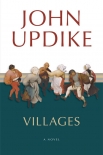Villages by John Updike (best summer reads of all time .TXT) 📗

- Author: John Updike
Book online «Villages by John Updike (best summer reads of all time .TXT) 📗». Author John Updike
When Owen suggested to Buddy Rourke that he donate his braces to the scrap drive, Buddy didn’t think it was funny. Buddy was a serious boy, headed for a career in engineering or construction or electricity. He could fix lamps, knowing how to insert and screw down hook-shapes of copper wire into the terminals of a switch and how to splice the wires of Christmas lights when a bad socket made the whole string dark. He taught Owen how to tame a current which would flow one way with magical, instant results but which with contacts reversed would balk and melt the wires. Buddy subscribed to Popular Mechanics and had sent away for a make-it-yourself radio kit that he had assembled to the point where you could hear static and a faint voice pulsing in and out. Though the two boys could achieve great rapport working on projects in Buddy’s cellar—not quite a rumpus room but better-lit than Owen’s, with a well-stocked workbench that had been created and abandoned by Buddy’s absent father—there was a potential awkwardness in the relationship because of Buddy’s being a year and a half older. Once, anticipating Buddy’s coming to his house one afternoon to play Monopoly—a game the boys for a season were passionate about, between their passions for gin rummy and chess—Owen had set up the board on the living-room rug with a loving elaboration, arranging the Chance and Community Chest cards in a spiral, like the staircases in Hollywood musicals, and setting out the red hotels and green wooden houses in a formal pattern, a perfect Christmas-colored village as if seen from an airplane.
Buddy, coming into the room, said with limpid disgust, “Oh, Owen!” and scrabbled the cards into the usual rough stack and dumped the hotels and houses back into the box. Owen was stung, and tried for the rest of his life not to risk showing how much he cared for somebody and then looking foolish. Make sure the circuits are established before plugging anything in: otherwise, meltdown.
After a fight over something soon forgotten, leaving the basement in tears, Owen heard himself yelling at Buddy, the crowning insult: “At least I have a father!”
To taunt his friend with this, his lack of a father—he was appalled at himself. Shame bubbled up like mucky black water when his foot went through thin ice in the swamp beyond the high-school grounds. Though he tried to apologize the next day, he was not sure the easy trust between him and Buddy was ever quite restored. Besides wiring things and gluing airplane models together, they used to spend hours making childish artifacts of no clear utility—plywood cutouts of Disney characters, for example. Owen would hold his breath as he delicately steered the thin blade of his coping saw around some fragile protuberance like Goofy’s muzzle or Mickey’s ears. Creatures from all the animated Disney cartoons, plus green-skinned gremlins invented to illustrate wartime slang, populated hundreds of armed-forces insignia; it almost seemed that Disney and Hollywood were running the war, with its cast of millions. Buddy wanted to be in the Corps of Engineers, making bridges for armies to cross on; Owen wanted to be a test pilot, pulling out of dives at the last second. He had met Buddy, in fact, while playing with a rubber-tracked toy M-4 tank in the playground sandbox, and this taller boy had come over and offered to show him his collection of model airplanes—P-51s and Zeros and Spitfires and Messerschmitts, some lead models and some he had carved himself out of balsa wood—in his basement, which was just up beyond the cornfield, a mere six odd house numbers from Owen’s house, and three beyond the ill-fated Hoffmans’. The Rourkes—Buddy and his mild-mannered mother and twerpy younger sister—lived not exactly in a house but in the first floor and basement of a double house, of yellow brick, fairly new. It held four families all told, people who couldn’t afford a house of their own, and this was a little like living on Second Street, or having a father who was not nice to your mother.
Owen was grateful he did not live in an apartment, just as he was glad not to be a girl or left-handed. Imagine having to write in that contorted position to avoid rubbing your hand in wet ink! He was a lucky person, he decided early. He was certainly lucky compared with the children of London or Leningrad or, later on, Berlin and Tokyo. When his family turned out all the lights and crouched on the stair landing to be away from flying glass, it was a mock air raid, a pretense, and when a plane droned overhead, and he waited with his heart pounding for the bomb to fall, it was of course one of our planes, and no bomb fell. But, then, why would Tojo and Hitler want to bomb Willow? Because of one little parachute factory?
His parents took walks on Sunday afternoons; decades would pass before Owen could see this custom as their way of asserting themselves as a young





Comments (0)